广东商学院2008年研究生考试复试试卷-F521法学综合
法律硕士联考民法学(非法学)真题2008年
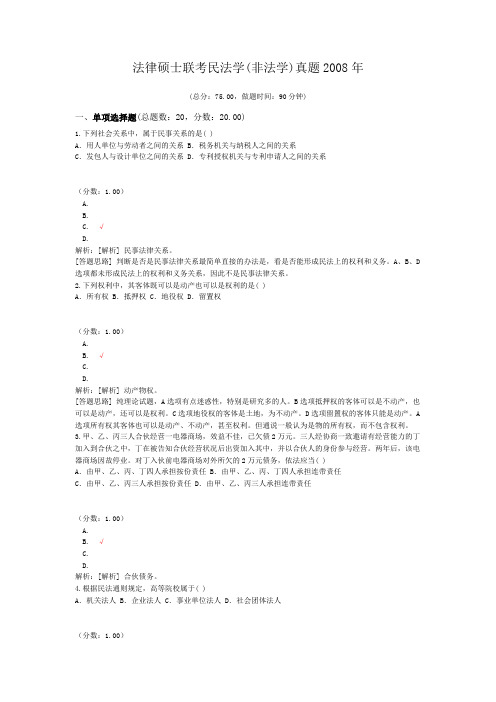
法律硕士联考民法学(非法学)真题2008年(总分:75.00,做题时间:90分钟)一、单项选择题(总题数:20,分数:20.00)1.下列社会关系中,属于民事关系的是( )A.用人单位与劳动者之间的关系 B.税务机关与纳税人之间的关系C.发包人与设计单位之间的关系 D.专利授权机关与专利申请人之间的关系(分数:1.00)A.B.C. √D.解析:[解析] 民事法律关系。
[答题思路] 判断是否是民事法律关系最简单直接的办法是,看是否能形成民法上的权利和义务。
A、B、D 选项都未形成民法上的权利和义务关系,因此不是民事法律关系。
2.下列权利中,其客体既可以是动产也可以是权利的是( )A.所有权 B.抵押权 C.地役权 D.留置权(分数:1.00)A.B. √C.D.解析:[解析] 动产物权。
[答题思路] 纯理论试题,A选项有点迷惑性,特别是研究多的人。
B选项抵押权的客体可以是不动产,也可以是动产,还可以是权利。
C选项地役权的客体是土地,为不动产。
D选项留置权的客体只能是动产。
A 选项所有权其客体也可以是动产、不动产,甚至权利。
但通说一般认为是物的所有权,而不包含权利。
3.甲、乙、丙三人合伙经营一电器商场,效益不佳,已欠债2万元。
三人经协商一致邀请有经营能力的丁加入到合伙之中,丁在被告知合伙经营状况后出资加入其中,并以合伙人的身份参与经营。
两年后,该电器商场因故停业。
对丁入伙前电器商场对外所欠的2万元债务,依法应当( )A.由甲、乙、丙、丁四人承担按份责任 B.由甲、乙、丙、丁四人承担连带责任C.由甲、乙、丙三人承担按份责任 D.由甲、乙、丙三人承担连带责任(分数:1.00)A.B. √C.D.解析:[解析] 合伙债务。
4.根据民法通则规定,高等院校属于( )A.机关法人 B.企业法人 C.事业单位法人 D.社会团体法人(分数:1.00)A.B.C. √D.解析:[解析] 法人的分类。
5.民法通则所称的重大误解不包括( )A.对民事行为性质的误解 B.对民事行为相对人的误解C.对民事行为内容的误解 D.对民事行为动机的误解(分数:1.00)A.B.C.D. √解析:[解析] 重大误解。
广东商学院2008年研究生考试复试试卷-英语口语测试
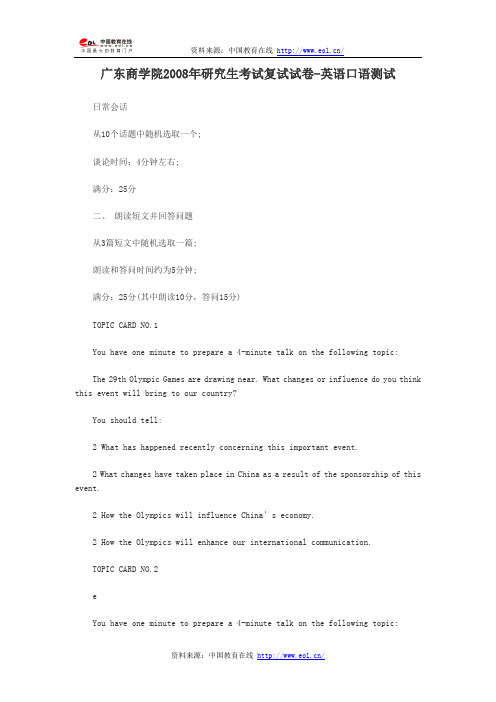
广东商学院2008年研究生考试复试试卷-英语口语测试日常会话从10个话题中随机选取一个;谈论时间:4分钟左右;满分:25分二、朗读短文并回答问题从3篇短文中随机选取一篇;朗读和答问时间约为5分钟;满分:25分(其中朗读10分,答问15分)TOPIC CARD NO.1You have one minute to prepare a 4-minute talk on the following topic:The 29th Olympic Games are drawing near. What changes or influence do you think this event will bring to our country?You should tell:2 What has happened recently concerning this important event.2 What changes have taken place in China as a result of the sponsorship of this event.2 How the Olympics will influence China’s economy.2 How the Olympics will enhance our international communication.TOPIC CARD NO.2eYou have one minute to prepare a 4-minute talk on the following topic:Nowadays there are many means of communication. Which do you think is the best one to communicate with your friends in another city?You should tell:2 What means of communication are available.2 Which means you like the best.2 What advantages you think this means has.2 How you make good use of these advantages.TOPIC CARD NO.3You have one minute to prepare a 4-minute talk on the following topic:In the recent years, many people are involved in the stock market. Do you think it’s good for students to take risk in the stock market? Why?You should tell:2 Who would be the most likely to get involved in the stock market.2 What should be needed for the stock investment.2 What risk the college students will take if they get involved in the stock market?2 What the college students will benefit from the investment?TOPIC CARD NO.4You have one minute to prepare a 4-minute talk on the following topic:Many accidents can be found at home. Can you describe some in details?You should tell:2 What dangers can be found in the kitchen that can cause accidents?2 What dangers can be found in bathrooms that can cause accidents?2 What other dangers can be found in a home in bedrooms, laundry rooms, garages, and living areas?2 What can be done throughout the house to prevent accidents?TOPIC CARD NO.5You have one minute to prepare a 4-minute talk on the following topic:Different places have different customs. Can you talk about the customs in your hometown?You should tell:2 Where is your hometown?2 Is your hometown famous for anything?2 What are the main attractions in your hometown?2 Has your hometown changed a lot since you were a kid? If so, how? Have the changes been for the better or worse?TOPIC CARD NO.6You have one minute to prepare a 4-minute talk on the following topic:What is the most interesting city to visit in your country?You should tell:2 Which city would you like to visit?2 Is this city famous for anything?2 What are the main attractions in this city?2 Which season is the best to visit this city? What’s the climate like?TOPIC CARD NO.7You have one minute to prepare a 4-minute talk on the following topic:Nowadays many people do volunteer work. Do you think that volunteer work is worth the time it takes? Why?You should tell:2 What is volunteer work?2 What are the volunteer activities that people do?2 Can you think of different types of volunteer work?2 Why do people do volunteer work?TOPIC CARD NO.8The origin of Refrigerators当前位置: 主页 / 综合训练 / 口语大全 / 现代文阅读与背诵You have one minute to prepare a 4-minute talk on the following topic:Gossip is common in our daily life. What harm may it do to communication?You should tell:2 Why do you think people like to listen to gossip?2 Why do people like to gossip about the rich and famous?2 What are some of the things you like to gossip about?2 What harms may gossip do to people?TOPIC CARD NO.9You have one minute to prepare a 4-minute talk on the following topic:People live under great stress in modern society. What can you do to release stress?You should tell:2 What is stress? What causes stress?2 How do you recognize stress in your life?2 How do you reduce stress in your life?2 Do you think they would be considered good or bad ways of dealing with stress?TOPIC CARD NO.10Read the story aloud, then answer the questions:A Butcher and AttendantDick was a clever boy, but his parents were poor, so he had to work to pay for his education in his spare time and during his holidays. In spite of this, he managed to get to the university, but it was so expensive to study there that he found it necessary to get two jobs at the same time so as to earn enough money to pay for his studies.One summer he managed to get a job in a butcher’s shop during the daytime, and another in a hospital at night. In the shop, he learnt to cut meat up quite nicely, so the butcher often left him to do all the serving while he went into a room behind the shop to do the accounts. In the hospital, on the other hand, he was, of course, allowed to do only the simplest jobs, like helping to lift people and carry them from one part of the hospital to another. Both at the butcher’s shop and at the hospital, Dick had to wear white clothes.One evening at the hospital, Dick had to help to carry a woman from her bed to the place where she was to have an operation. The woman was already feeling frightened at the thought of the operation before he get to her, but when she saw Dick, that frightered her.“No! No!” she cried. “Not my butcher! I won’t be operated on by my butcher!”and fainted away.A Butcher and AttendantQuestions:1. What did Dick have to do in order to go to the university?2. What did he learn in the shop?3. Why did the woman faint away?The Daughter and the PreacherThere was an old man who had a daughter. He told his daughter that he had invited a preacher to his house. He said, “Daughter, I’m going down to the train to meet the Reverend, and I’ve roasted two ducks and left them there for him in the other room. Don’t you touch them!” The daughter said, “No, I won’t touch them.” So her papa went to the train to meet the Reverend, and the girl began to taste the ducks. The ducks tasted so good that she kept on tasting them until she had eaten them all up, every bit of them.After the old man came back, he didn’t even look in the place where he had left the ducks. He went directly into the other room to sharpen his knife on the oilstone so he could carve the ducks. The preacher was sitting in the room with the girl. She knew that her papa was going to punish her, and she started crying and shedding tears. The preacher asked, “What is the matter with you, girl?”She said, “Papa has this one bad fault: He invites preachers to his house and goes to sharpen his knife to cut off both their ears.”And the Reverend asked, “What is that you say, daugher?”The girl said, “Yes, Papa invites preachers here all the time and cuts off both their ears.” The preacher said, “Daughter, hand me my hat. Quick!” The girl gave him his hat and he ran out of the door quickly. The daugher called her papa and said, “Papa, the preacher got both the ducks and has gone.”The old man ran to the door and yelled to the preacher, “Hey, where are you going in such a hurry? Come back here right now!”But the preacher just kept running and shouted back over his shoulder, “Damned if you’ll get either one of these.”The Daughter and the PreacherQuestions:1. What did the father ask the daughter not to do?2. Why did the preacher run away?3. What do you think of the daughter?Mexican SmugglerJuan comes up to the Mexican border on his bicycle. He’s got two large bags over his shoulders. The guard stops him and says, “What’s in the bags?”“Sand,” answered Juan.The guard says, “We’ll just see about that. Get off the bike.” The guard takes the bags and rips them apart. He empties them out and finds nothing in them but sand.He detains Juan overnight and has the sand analysed, only to discover that there is nothing but pure sand in the bags.The guard releases Juan, puts the sand into new bags, hefts them onto the man’s shoulders, and lets him cross the border.A week later, the same thing happens. The guard asks, “What have you got?”“Sand,” says Juan.The guard does his thorough examination and discovers that the bags contain nothing but sand. He gives the sand back to Juan, and Juan crosses the border on his bicycle.This sequence of events is repeated every week for three years. Finally, Juan doesn’t show up and one day the guard meets him in a bar in Mexico.“Hey, buddy,” says the guard. “I know you are smuggling something. It’s driving me crazy. It’s all I think about…I can’t sleep. Just between you and me, what are you smuggling?”Juan sips his beer and says, “Bicycles”.Mexican SmugglerQuestions:1. What does Juan carry when he comes up to the Mexican border?2. What does the guard suspect about Juan?3. What is Juan smuggling?。
广东商学院法语2008真题

2008年广东商学院法语考研试题一、词语选择( 20题,每题1分,共20分)1. Après une ____ absence, je revois fumer le toit de ma maison.A. longuetB. longeC. longueD. ronde2. Ma distraction ____ est une partie de ping-pong.A. favoriB. favoriteC. favoriséD. favorable3. Je ferai pour vous une démarche ____.A. discretB. discrèteC. disposéD. discuté4. La mauvaise nouvelle se répandit rapidement ; heureusement elle était ____.A. fauveB. fauxC. fausseD. faute5. La matinée est un peu ____ aujourd’hui.A. fraîcheB. fraisC. francD. franche6. Le président de la République a prononcé une ____ télévisée hier à midi.A. plaidoirieB. allocutionC. paroleD. accusation7. Les pompiers ont réussi à éteindre le ____.A. malheurB. rêveC. criD. feu8. J’aime la ____ beauté des vallées valaisannes.A. fiertéB. fièreC. fierD. frère9. Admirez la grâce et la blancheur ____ du cygne.A. neigeuxB. neigeuseC. neigeusesD. neige10. Bien mûrs, la poire et l’abricot sont ____.A. délicieuxB. délicieusesC. délicieuseD. délice11. Son cœur et son intelligence étaient ____ à recueillir le bon grain sans effort.A. prêtsB. prêtC. prêtesD. prêtres12. On fait ____ de ceux qui ont participé à la lutte contre l’inondation.A. la gloireB. l’élogeC. le reculD. la critique13. ____ de leur journée, Pierre et sa sœur rentrent joyeux à la maison.A.ContentesB. ContentC. ContentsD. Contente14. C’étaient trois femmes d’un esprit et d’une beauté ____.A. exceptionnellesB. exceptionnelleC. exceptionnelsD. exceptions15. Ses yeux étaient bleus ; ses lèvres ____.A. roses lilasB. rose lilasC. rosé lilasD. roseraie lilas16. Le premier octobre constitue la fête ____ du peuple chinois.A. nationaleB. officielleC. populaireD. magnifique17. Toute chose a des défauts, rien n’est ____.A. parfaitB. imparfaitC. possibleD. impossible18. Soyons optimistes : ce demi-échec est aussi une ____ -réussite.A. demisB. demiC. demiseD. demies19. Il ne lit presque jamais de romans ____ de poésie classique.A. au moinsB. du moinsC. encore moinsD. sans dire20. La bombe atomique lancée sur Hirochima, le 6 août 1945, a tué plus de ____ personnes.A. quatre-vingt milleB. quatre-vingts milleC. quatre-vingt mille deD. quatre-vingt milles二、句法结构( 20题,每题1分,共20分)1. Si cet homme ____ malade, que deviendra sa famille ?A. tombeB. tomberaC. tombaitD. tomberait2. En te quittant ce matin, je me suis dit que tu ____ le moyen pour résoudre ce problème avant mon retour.A. as trouvéB. trouverasC. auras trouvéD. aurais trouvé3. Dès qu’ils eurent déjeuné, ils ____ la discussion.A. ont reprisB. reprendirentC. avaient reprisD. reprirent4. Les petits ruisseaux ____ les grandes rivières.A. fontB. ont faitC. ferontD. faisaient5. Christophe respirait à pleins poumons, sans se douter du malheur qui lui ____ quelques instants avant.A. était arrivéB. fut arrivéC. est arrivéD. sera arrivé6. Rira bien qui ____ le dernier.A. aura riB. sera riC. riraD. a ri7. Elle espérait que sa mère lui ____ des bandes dessinées.A. apporteraitB. apporteraC. apportaitD. apporta8. M. Dupont ____ se mettre à table lorsqu’on frappa à la porte.A. iraB. iraitC. vaD. allait9. L’année dernière, ils ne ____ qu’une lettre.A. s’écrivirentB. s’ont écritC. se sont écritD. se sont écrits10. Il est triste depuis qu’il ____ son travail.A. a perduB. perdC. perditD. perdait11. Quand je suis arrivé à Beijing, le soleil ____.A. avait brilléB. brilleC. brilleraitD. brillait12. L’habit ____ le moine.A. ne fait pasB. ne fera pasC. n’a pas faitD. ne faisait pas13. Si tu ____ te reposer un peu ?A. irasB. vasC. iraisD. allais14. Il tremble comme s’il ____ froid.A. aB. aitC. avaitD. avait été15. Aussitôt qu’il eut reçu les articles, il ____ à les tirer.A. se soit misB. se mettraC. se mitD. se mettrait16. Depuis mille ans cet édifice ____ les intempéries.A. braveB. a bravéC. bravaitD. a été bravé17. S’il ____ chez lui hier soir, il aurait déjà fini son travail.A. était restéB. avait restéC. resteD. restait18. Après qu’on ____ de l’accident, il se rendit à l’hôpital.A. l’avertitB. l’avait avertiC. l’a avertiD. l’eut averti19. Dans quelques jours, mon ami ____ me voir à l’hôpital.A. est venuB. viendraC. vientD. sera venu20. On récoltera ce qu’on ____.A. a seméB. avait seméC. sèmeD. aura semé三、阅读理解( 2篇,10题,每题2分,共20分)1. Qu’est-ce que c’est que le Tour de France ?Le Tour de France, c’est beaucoup plus qu’un exploit cycliste, c’est à la fois une fête populaire et une légende internationale.Créé en 1903, le parcours, qui, au début, était appelé “ la Grande Boucle ”,et qui ne dépassait guère les 2500 km, en fait en moyenne 4000 aujourd’hui. Le Tour a lieu tous les ans au mois de juillet en France. C’est une course par étapes de 150 à 200 km, et les étapes les plus difficiles sont celles de montagne dans les Pyrénées et les Alpes. Les coureurs viennent de tous les pays d’Europe, et forment près de 20 équipes qui s’affrontent et forment un total de 180 à 200 participants. A la fin de chaque étape, on établit le classement de l’étape et le classement général. Le coureur le plus rapide au classement général porte “ le maillot jaune ” .Nul doute que c’est une bonne part grâce au Tour de France que l’idée sportive s’est popularisée en France.Quant à la caravane de Tour de France, c’est une véritable ville ambulante de 2000 personnes, comprenant des organisateurs, des assistants techniques et des journalistes entre autres. Tous ces professionnels sont là pour régler les problèmes d’organisation et d’intendance très nombreux, compte tenu de l’ampleur de cette manifestation.Depuis plusieurs années, les responsables essaient d’élargir la représentation internationale des coureurs cyclistes, même accepter les amateurs.Le Tour de France, s’il est cher au cœur des Français, est aussi une des épreuves internationales parmi les plus prestigieuses du cyclisme. Près de 600 journalistes, dont beaucoup d’étrangers, en assurent la couverture. A cela, li faut ajouter l’arrivée sur les Champs-Élysées, diffusée en mondovision pour 900 millions de téléspectateurs.Notesintendance n. f. 后勤parcours n. m. 比赛的全程 compte tenu de loc. 考虑到,由于boucle n. f. 圆环 ampleur n. f. 规模prestigieux, se adj. 有声望的,享有盛誉的 couverture n. f. 完全报导caravane n. f. 自行车赛车队 ambulant, e adj. 流动的,巡回的Questions1. Quand le Tour de France a-t-il été créé ?A. en 1901B. en 1902C. en 1903D. en 19042. Au début, le Tour de France était appelé______.A. la Grande BoucleB. la Petite BoucleC. le Tour de FranceD. le Tour d’Europe3. En quel mois le Tour de France a-t-il lieu tous les ans ?A. en juinB. en juilletC. en aoûtD. en septembre4. Quel est le parcours du Tour de France aujourd’hui ?A. 1000 kmB. 2000 kmC. 3000 kmD. 4000 km5. Selon l’auteur, le Tour de France est ______.A. une épreuve françaiseB. une épreuve internationaleC. une épreuve européenneD. une épreuve française et italienne2. La vie dans les immeubles neufs à vingt kilomètres de ParisLa question n\'est pas de regretter mon ancien logement , bien sûr , me dit la dame brune . Mais ce qui nous pèse le plus ici , voyez-vous , c\'est la solitude . Nous maris partent beaucoup plus tôt le matin et rentrent beaucoup plus tard le soir . Leur travail , évidemment , est trois fois plus loin . A Paris , quand vous avez fait votre ménage , quand vous en avez fini avec la couture ou la lessive des gosses, vous pouvez toujours , de temps en temps , vous changer les idées :un petit tour dans les grands magasins , quelques courses aux Champs-Elysées ou sue les boulevards, un saut chez une amie , une visite d\'exposition quelconque ... je ne sais pas, moi ... Mais ici qu\'est-ce qu\'il y a pour se détendre ? On ne peut pas passer son temps à lire ou à regarder la télé! Les magasins des Centres commerciaux ? Ils sont bien mieux qu\'au début . Mais ils sont encore trop rares à mon goût, pas assez variés ... et trop chers.1. "La question n\'est pas de regretter mon ancien logement , bien sûr , me dit la dame brune ." Cela veut dire queA. la dame brune regrette d\'avoir quitté son ancien logement .B. la dame brune n\'a pas éprouvé de peine pour avoir quitté son ancien logement .C. la dame brune ne voulait pas changer de résidence.D. la dame brune pense beaucoup à son ancien logement.2. " Mais ce qui nous pèse le plus ici ,... c\'est la solitudes." Dans cette phrase , que signifie "ce qui nous pèse" ?A. ce qui nous rend lourdB. ce qui nous paraît pénibleC. ce qui nous plaîtD. ce qui nous surcharge3. "... vous pouvez toujours ... vous changer les idées ", cela veut dire queA. vous pouvez toujours changer d\'idées .B. vous pouvez toujours aller discuter avec qn.C. vous pouvez toujours aller vous distraire.D. vous pouvez toujours changer de logement dont le style ne vous plaît pas .4. "quelques courses aux Champs-Elysées " veut dire:A. des achats dans les magasins des Champs-ElyséesB. des leçons aux Champs-ElyséesC. des marches rapides le long des Champs-Elysées sD. des promenades le long des Champs-Elysées5. De quoi parle cette dame?A. Elle parle des inconvénients de la vie dans les banlieues de Paris .B. Elle parle des avantages de la vie dans les immeubles loin de Paris.C. Elle raconte son emploi du temps.D. Elle parle des avantages de son ancien logement.四、法译汉( 1篇,共10分)Le principe est simple: assurer, par les lignes de téléphone, le passage des informations entre le centre d\'informations et les clients. Le Minitel (电话终端)n\'est pas un ordinateur, mais il en met des milliers à votre disposition en leur transmettant vos demandes et en registrant les réponses.Le Minitel a fait de la haute technologie un outil quotidien. A Saint-Cloud dans les Hauts - de – Seine (上塞纳省) , le marie Jean-Pierre Fourcade, fait paraître l\'information de la ville sur Minitel, ce qui permet à ses quelque 30,000 habitants de le consulter tranquillement chez eux, que ce soit pour y chercher un offre d\'emploi ou une idée de sortie pour le samedi soir.五、汉译法( 5题,每题2分,共10分)1.他变化很大,我都认不出他来了。
广东商学院考试试题参考答案及评分标准(5)
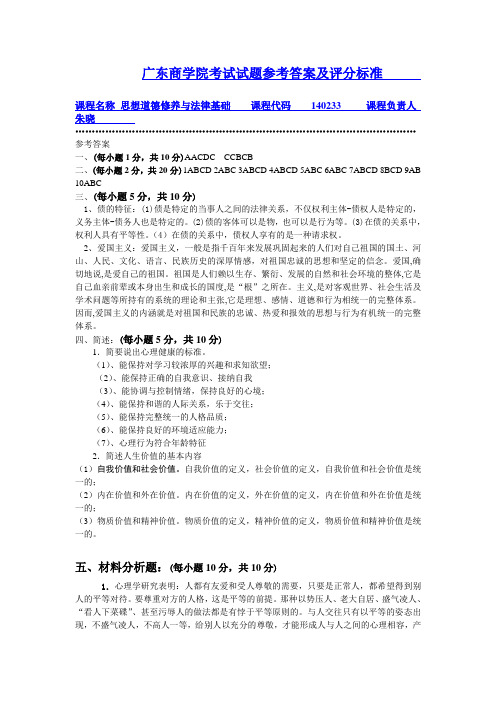
广东商学院考试试题参考答案及评分标准课程名称思想道德修养与法律基础课程代码140233 课程负责人朱晓…………………………………………………………………………………………参考答案一、(每小题1分,共10分)AACDC CCBCB二、(每小题2分,共20分)1ABCD 2ABC 3ABCD 4ABCD 5ABC 6ABC 7ABCD 8BCD 9AB 10ABC三、(每小题5分,共10分)1、债的特征:(1)债是特定的当事人之间的法律关系,不仅权利主体-债权人是特定的,义务主体-债务人也是特定的。
(2)债的客体可以是物,也可以是行为等。
(3)在债的关系中,权利人具有平等性。
(4)在债的关系中,债权人享有的是一种请求权。
2、爱国主义:爱国主义,一般是指千百年来发展巩固起来的人们对自己祖国的国土、河山、人民、文化、语言、民族历史的深厚情感,对祖国忠诚的思想和坚定的信念。
爱国,确切地说,是爱自己的祖国。
祖国是人们赖以生存、繁衍、发展的自然和社会环境的整体,它是自己血亲前辈或本身出生和成长的国度,是“根”之所在。
主义,是对客观世界、社会生活及学术问题等所持有的系统的理论和主张,它是理想、感情、道德和行为相统一的完整体系。
因而,爱国主义的内涵就是对祖国和民族的忠诚、热爱和报效的思想与行为有机统一的完整体系。
四、简述:(每小题5分,共10分)1.简要说出心理健康的标准。
(1)、能保持对学习较浓厚的兴趣和求知欲望;(2)、能保持正确的自我意识、接纳自我(3)、能协调与控制情绪,保持良好的心境;(4)、能保持和谐的人际关系,乐于交往;(5)、能保持完整统一的人格品质;(6)、能保持良好的环境适应能力;(7)、心理行为符合年龄特征2.简述人生价值的基本内容(1)自我价值和社会价值。
自我价值的定义,社会价值的定义,自我价值和社会价值是统一的;(2)内在价值和外在价值。
内在价值的定义,外在价值的定义,内在价值和外在价值是统一的;(3)物质价值和精神价值。
广东商学院统计学基础(复试)2008真题

2008年广东商学院统计学基础考研复试试题
一、名词解释( 4题,每题5分,共20分)
1.变量数列
2.众数
3.抽样平均误差
4.平均指标指数
二、计算与分析( 3题,共50分)
1. 某市2007年第四季度社会商品零售额为36200万元,2008年第一季度38000万元,零售物价上涨
8.1%,试计算该市第一季度社会商品零售额指数、零售价格指数和零售量指数,以及由于零售价格上涨居民多支出的金额。
(15分)
2. 某地区1995~2000年GDP的有关速度指标如下表:
要求:填出表中问号所代表的数字并列出计算式。
( 10分)
3. 设年末某储蓄所按储蓄存款户账号的大小为序,每隔 10户抽一户,共抽取100户的资料如下:(25分)
试以 95.45%(t=2)的概率,估计以下指标的范围:
⑴该储蓄所存款户平均每户存款余额;
⑵该所储蓄存款余额在 30000元以上的户数占全部存款户数的比重。
三、简述题( 2题,每题15分,共30分)
1.试述假设检验的基本思想
2.试述消费者价格指数(CPI)的编制要点。
02至08年真题
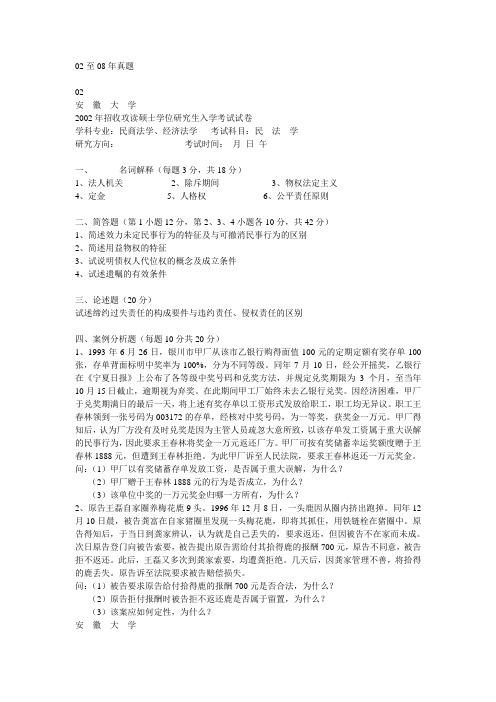
02至08年真题02安徽大学2002年招收攻读硕士学位研究生入学考试试卷学科专业:民商法学、经济法学考试科目:民法学研究方向:考试时间:月日午一、名词解释(每题3分,共18分)1、法人机关2、除斥期间3、物权法定主义4、定金5、人格权6、公平责任原则二、简答题(第1小题12分,第2、3、4小题各10分,共42分)1、简述效力未定民事行为的特征及与可撤消民事行为的区别2、简述用益物权的特征3、试说明债权人代位权的概念及成立条件4、试述遗嘱的有效条件三、论述题(20分)试述缔约过失责任的构成要件与违约责任、侵权责任的区别四、案例分析题(每题10分共20分)1、1993年6月26日,银川市甲厂从该市乙银行购得面值100元的定期定额有奖存单100张,存单背面标明中奖率为100%,分为不同等级。
同年7月10日,经公开摇奖,乙银行在《宁夏日报》上公布了各等级中奖号码和兑奖方法,并规定兑奖期限为3个月,至当年10月15日截止,逾期视为弃奖。
在此期间甲工厂始终未去乙银行兑奖。
因经济困难,甲厂于兑奖期满日的最后一天,将上述有奖存单以工资形式发放给职工,职工均无异议。
职工王春林领到一张号码为003172的存单,经核对中奖号码,为一等奖,获奖金一万元。
甲厂得知后,认为厂方没有及时兑奖是因为主管人员疏忽大意所致,以该存单发工资属于重大误解的民事行为,因此要求王春林将奖金一万元返还厂方。
甲厂可按有奖储蓄幸运奖额度赠于王春林1888元,但遭到王春林拒绝。
为此甲厂诉至人民法院,要求王春林返还一万元奖金。
问:(1)甲厂以有奖储蓄存单发放工资,是否属于重大误解,为什么?(2)甲厂赠于王春林1888元的行为是否成立,为什么?(3)该单位中奖的一万元奖金归哪一方所有,为什么?2、原告王磊自家圈养梅花鹿9头。
1996年12月8日,一头鹿因从圈内挤出跑掉。
同年12月10日晨,被告龚富在自家猪圈里发现一头梅花鹿,即将其抓住,用铁链栓在猪圈中。
2008年广东商学院管理学考研真题
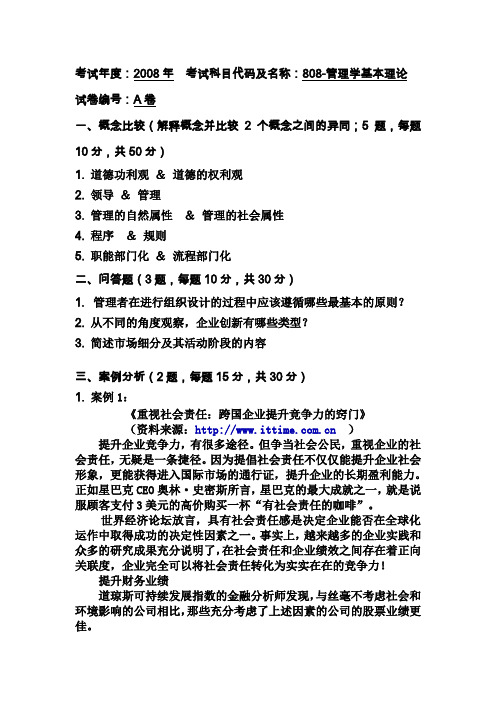
考试年度:2008年考试科目代码及名称:808-管理学基本理论试卷编号:A卷一、概念比较(解释概念并比较 2 个概念之间的异同;5题,每题10分,共50分)1.道德功利观&道德的权利观2.领导&管理3.管理的自然属性&管理的社会属性4.程序&规则5.职能部门化&流程部门化二、问答题(3题,每题10分,共30分)1. 管理者在进行组织设计的过程中应该遵循哪些最基本的原则?2.从不同的角度观察,企业创新有哪些类型?3.简述市场细分及其活动阶段的内容三、案例分析(2题,每题15分,共30分)1.案例1:《重视社会责任:跨国企业提升竞争力的窍门》(资料来源:)提升企业竞争力,有很多途径。
但争当社会公民,重视企业的社会责任,无疑是一条捷径。
因为提倡社会责任不仅仅能提升企业社会形象,更能获得进入国际市场的通行证,提升企业的长期盈利能力。
正如星巴克CEO奥林·史密斯所言,星巴克的最大成就之一,就是说服顾客支付3美元的高价购买一杯“有社会责任的咖啡”。
世界经济论坛放言,具有社会责任感是决定企业能否在全球化运作中取得成功的决定性因素之一。
事实上,越来越多的企业实践和众多的研究成果充分说明了,在社会责任和企业绩效之间存在着正向关联度,企业完全可以将社会责任转化为实实在在的竞争力!提升财务业绩道琼斯可持续发展指数的金融分析师发现,与丝毫不考虑社会和环境影响的公司相比,那些充分考虑了上述因素的公司的股票业绩更佳。
2002年,美国DePaul大学的Curtis C. Verschoor教授和Elizabeth Murphy副教授进行了一项专门针对企业社会责任与财务业绩的研究。
该研究将美国民众评出的100家“最佳企业公民”与“标准普尔500强”中其他企业的财务业绩进行比较。
结果发现,“最佳企业公民”的整体财务状况要远远优于“标准普尔500强”的其他企业,前者的平均得分要比后者的平均值高出10个百分点。
降低运营成本,提高效率如今,众多企业整天绞尽脑汁,苦苦思索如何开源节流,实际上,以杜邦和3M为代表的“企业公民”早已另辟蹊径,从防患于未然入手,有效解决了这一难题。
广东财经大学西方法律思想史2008--2011,2014年考研专业课复试真题
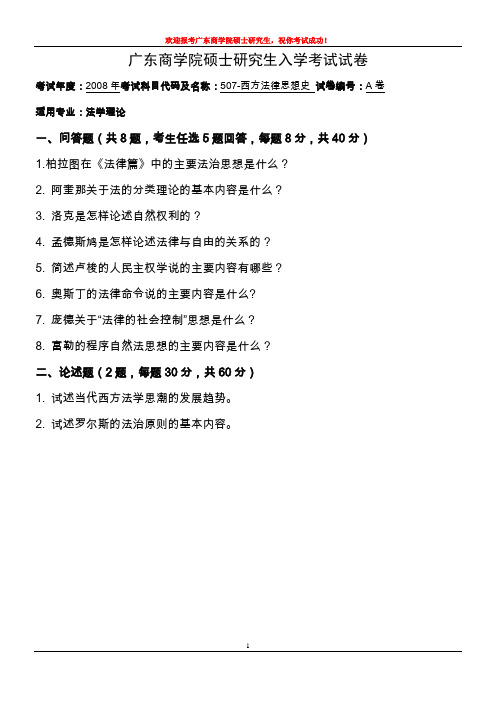
欢迎报考广东商学院硕士研究生,祝你考试成功!
广东商学院硕士研究生入学考试试卷
考试年度:2008年考试科目代码及名称:507-西方法律思想史试卷编号:A卷适用专业:法学理论
一、问答题(共8题,考生任选5题回答,每题8分,共40分)
1.柏拉图在《法律篇》中的主要法治思想是什么?
2. 阿奎那关于法的分类理论的基本内容是什么?
3. 洛克是怎样论述自然权利的?
4. 孟德斯鸠是怎样论述法律与自由的关系的?
5. 简述卢梭的人民主权学说的主要内容有哪些?
6. 奥斯丁的法律命令说的主要内容是什么?
7. 庞德关于“法律的社会控制”思想是什么?
8. 富勒的程序自然法思想的主要内容是什么?
二、论述题(2题,每题30分,共60分)
1. 试述当代西方法学思潮的发展趋势。
2. 试述罗尔斯的法治原则的基本内容。
广东商学院硕士研究生入学考试试卷
1。
2008年全国法律硕士联考真题答案详解专业综合课
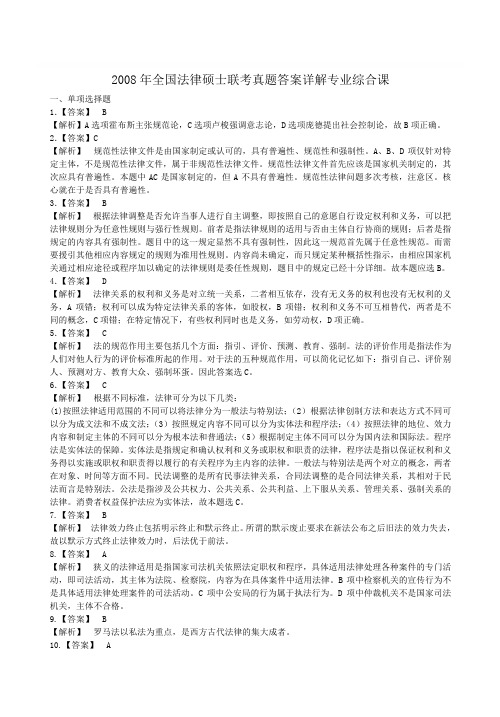
2008年全国法律硕士联考真题答案详解专业综合课一、单项选择题1.【答案】 B【解析】A选项霍布斯主张规范论,C选项卢梭强调意志论,D选项庞德提出社会控制论,故B项正确。
2.【答案】C【解析】规范性法律文件是由国家制定或认可的,具有普遍性、规范性和强制性。
A、B、D项仅针对特定主体,不是规范性法律文件,属于非规范性法律文件。
规范性法律文件首先应该是国家机关制定的,其次应具有普遍性。
本题中AC是国家制定的,但A不具有普遍性。
规范性法律问题多次考核,注意区。
核心就在于是否具有普遍性。
3.【答案】 B【解析】根据法律调整是否允许当事人进行自主调整,即按照自己的意愿自行设定权利和义务,可以把法律规则分为任意性规则与强行性规则。
前者是指法律规则的适用与否由主体自行协商的规则;后者是指规定的内容具有强制性。
题目中的这一规定显然不具有强制性,因此这一规范首先属于任意性规范。
而需要援引其他相应内容规定的规则为准用性规则。
内容尚未确定,而只规定某种概括性指示,由相应国家机关通过相应途径或程序加以确定的法律规则是委任性规则,题目中的规定已经十分详细。
故本题应选B。
4.【答案】 D【解析】法律关系的权利和义务是对立统一关系,二者相互依存,没有无义务的权利也没有无权利的义务,A项错;权利可以成为特定法律关系的客体,如股权,B项错;权利和义务不可互相替代,两者是不同的概念,C项错;在特定情况下,有些权利同时也是义务,如劳动权,D项正确。
5.【答案】 C【解析】法的规范作用主要包括几个方面:指引、评价、预测、教育、强制。
法的评价作用是指法作为人们对他人行为的评价标准所起的作用。
对于法的五种规范作用,可以简化记忆如下:指引自己、评价别人、预测对方、教育大众、强制坏蛋。
因此答案选C。
6.【答案】 C【解析】根据不同标准,法律可分为以下几类:(1)按照法律适用范围的不同可以将法律分为一般法与特别法;(2)根据法律创制方法和表达方式不同可以分为成文法和不成文法;(3)按照规定内容不同可以分为实体法和程序法;(4)按照法律的地位、效力内容和制定主体的不同可以分为根本法和普通法;(5)根据制定主体不同可以分为国内法和国际法。
广东商学院2008年研究生考试复试试卷-F513英语水平测试

广东商学院2008年研究生考试复试试卷-F513英语水平测试一、完形填空(1篇,每空1分,共15分)I. Cloze Test (15 points, 1 for each, 15%)Directions: In this part, there are two passages with fifteen blanks. There are 20 words given here and you can choose any 15 words to fill in the 15 blanks.(entire aside to engage unsteady titter gilded remade great avenged over wife string higher grabbed hate blackboard instant happy upon )Now the master, mellow almost to the verge of geniality, put his chair 1 , turned his back to the audience, and began to draw a map of American on the 2 , to exercise the geography class upon. But he made a sad business of it with his 3 hand, and a smothered 4 rippled over the house. He knew what the matter was and set himself to right it. He sponged out lines and 5 them; but he only distorted them more than ever, and the tittering was more pronounced. He threw his 6 attention upon his work, now as if determined not to be put down by the mirth. He felt that all eyes were fastened 7 him; he imagined he was succeeding, and yet the tittering continued; it even manifestly increased. And well it might. There was a garret above, pierced with a scuttle 8 his head and down through this scuttle came a cat, suspended around the haunches by a string; she had a rag tied about her head and jaws 9 keep her from mewing; as she slowly descended she curved upward and clawed at the 10 , she swung downward and clawed at the intangible air. The tittering rouse higher and 11 ----the cat was within six inches of the absorbed teacher’s head----down, a little lower, and she 12 his wig with her desperate claws, clung to it, and was snatched up into the garret in an 13 with her trophy still in her possession! And how the light did blaze abroad from the master’s bald pate----for the sign painter’s boy had 14 it!That broke up the meeting. The boys were 15 . Vacation had come.二、阅读理解 (4题,每篇5题,每题2分,共40分)II. Reading and Comprehension (40%)Directions: There are 4 passages in this part. Each passage is followed by some questions or unfinished statements. For each of them there are four choices marked A) ,B) ,C) and D). You should decide on the best choice.Questions 1 to 5 are based on the following passage:America is the land of the automobile. This country has only 6 percent of the world's population but 46 percent of the world's cars. Right now, there are 97 million privately owned cars consuming 75 billion gallons of gasoline and traveling an estimated 1,000 billion miles a year. The figures also affirm something we know every time we refill our gasoline tank. The automobile is a very thirsty piece of technology. Of the total petroleum supply in the UnitedStates, 30 percent goes to satisfy that thirst. Every year for each passenger car, about 800 gallons of gasoline are consumed.Other aspects of the automobile are worth reminding of here. It takes a great deal of energy to manufacture one automobile. We also expend energy in the process of shipping cars from factories to showrooms, displaying them for sale and making replacement parts for repairs. About two gallons of gasoline are consumed in the process of making every ten gallons that are pumped into an automobile's gas tank.Building highways and parking lots has used up much of our land. It has been estimated that we have paved over 21,000 square miles of this country's surface, most of it to accommodate the automobile. The automobile is also the largest contributor to our nation's air pollution problem.Apart from the great impact that would occur if everyone seriously practised conservation, one should stop and think about his own casual use of the automobile. There are numerous situations where better planning and awareness could really make a difference in energy savings and dollars. Because the automobile uses the largest percentage of energy in an average American family's energy budget and almost half of the dollars, the impetus for saving is tremendous.1. According to the author, most people realize that ____.A) other sources of energy must be foundB) great efforts have been made to solve the energy problemC) the automobile uses large amounts of gasolineD) it is the automobile that causes the energy problem2. Most people do not realize that ____.A) the manufacture of the automobile requires much energyB) gasoline is more expensive than home-heating oilC) oil resources could some day run outD) the automobile is a thirsty machine3. According to the passage, the automobile uses much of our energy and____.A) gasoline B) petroleumC) highways D) land4. The author implies that____.A) small cars use energy efficientlyB) anti-pollution devices on cars are not effectiveC) Americans have to import a great quantity of gasoline each yearD) Americans waste energy5. The best title for the passage should be _____.A) Automobile—America’s Thirsty MachineB) Energy ProblemC) Importance of Energy ConservationD) Automobile and Energy ProblemQuestions 6 to10 are based on the following passage:Over 60 million persons in the United States own a credit card, which has had the effect of increasing consumption possibilities for households by allowing them to make heavy purchases without giving up a single dollar and coin for them. In fact, thousands of dollars of merchandise, ranging from autos, clothing, to electrical appliances are purchased by buyers through the credit card. Credit cards have also been of significant importance to the national economy. Businessmen have been encouraged to expand plant and equipment and hire additional personnel to meet theheavy demand for their products. The tendency of employment and income would be to rise significantly.Unfortunately, the ease with which buyers can increase their purchase with credit cards have caused them to overlook the additional costs. Purchases on credit cards are postponed payments. Buy-now-and-pay-later encourages buyers to use credit cards extensively. Since the buyer is in effect borrowing money for a specific purpose, he must expect to pay an interest charge. Interest is the price of using money over a long period of time. A close analysis of the use of credit cards for heavy purchases will show that the buyer has added to the cost of making these purchases. It must also be kept in mind that unpaid monthly balances means added interest charges. Furthermore, the use of credit cards will add to the cost of the product since the shopkeeper does not receive the money at the time of purchase. Shopkeeper might add on the cost of handling credit cards to the bill.6. This passage is mainly concerned with____.A) the cashless economyB) the cost of making payments by credit cardsC) the advantages of credit cardsD) the necessity of using credit cards7. According to the passage ,which of the following is NOT true about the use of credit cards?A) It affects the level of employment and income.B) It is significant to the national economy.C) It stimulates people to buy more.D) It makes purchasing more complicated.8. When a buyer makes a purchase by credit cards, the problem encountered by him is______.A) the changing tendency of interest ratesB) the rise of the price of productsC) the rise in insurance rates when credit cards are lostD) the added cost of a product9. Interest charges for the use of credit cards reflect____.A) the cost of owning a credit cardB) the unpaid balance of a monthly billC) the shopkeeper's cost of handling credit cardsD) the price of using money for a long period of time10. The author of the passage implies that____.A) credit cards tend to raise interest chargesB) buyers should not use credit cards at allC) buyers should make purchases with credit cards cautiouslyD) the use of credit cards reduces the consumption possibilitiesQuestions 11 to 15 are based on the following passage:The modern age is an age of electricity. People are so used to electric lights radio televisions, and telephones that it is hard to imagine what life would be like without them. When there is a power failure, cars hesitate in the streets because there are no traffic lights to guide them, and food spoils in silent refrigerators.Yet, people began to understand how electricity works only a little more than two centuries ago. Nature has apparently been experimenting in this field for millions of years. Scientists are discovering more and more that the living world may hold many interesting secrets of electricity that could benefit humanity.All living cells send out tiny pulses of electricity. As the heart beats, it sends out pulses, which can be recorded in an electrocardiogram, and a doctor can study it to determine how well the heart is working. The electric currents generated by most living cells are extremely small--often so small that sensitive instruments are needed to record them. But in some animals, certain muscle cells have becomeso specialized as electrical generators that they do not work as muscle cells at all. When large numbers of these cells are linked together, the effects can be astonishing.The electric eel is an amazing storage battery. It can send as much as eight hundred volts of electricity through the water in which it lives (An electric house current is only one hundred twenty volts.). As many as fourfifths of all the cells in the electric eel's body are specialized for generating electricity ,and the strength of the shock it can deliver corresponds roughly to the length of its body.11. What is the main idea of the passage?A) Electric eels are dangerous.B) Biology and electricity appear to be closely related.C) People would be at a loss without electricity.D) Scientists still have much to discover about electricity.12. The author mentions all of the following as a result of a power failure except that ____.A) refrigerated food items may go badB) traffic lights do not workC) cars run slowly in the streetsD) People must rely on candlelight13. Why does the author mention electric eels?A) To warn the reader to keep away from them.B) To compare their voltage to that used in houses.C) To give an example of a living electrical generator.D) To describe a new source of electrical power.14. How many volts of electricity can an electric eel emit?A) 1,000. B) 800.C) 200. D) 120.15. It can be inferred that the longer an eel is, the_____.A) more beneficial it will be to scienceB) more powerful its electrical charge will beC) easier it will be to findD) tougher it will be to eatQuestions 16 to 20 are based on the following passage:If it were only necessary to decide whether to teach elementary science to everyone on a mass basis or to find the gifted few and take them as far as they can go, our task would be fairly simple. The public school system, however, has no such choice, for the jobs must be carried on at the same time. Because we depend so heavily upon science and technology for our progress, we must produce specialists in many fields. Because we live in a democratic nation, whose citizens make the policies for the nation, large numbers of us must be educated to understand, to support ,and when necessary ,to judge the work of experts. The public school must educate both producers and users of scientific services.In education, there should be a good balance among the branches of knowledge that contribute to effective thinking and wise judgement. Such balance is defeated by too much emphasis on any one field. This question of balance involves not only the relation of the natural sciences, the social sciences, and the arts but also relative emphases among the natural sciences themselves.Similarly, we must have a balance between current and classical knowledge. The attention of the public is continually drawn to the discovery of new knowledge; these should not be allowed to turn our attention away from the sound ,established materials that form the basis of courses for beginners.16. According to the first paragraph, the task of education is fairly complicated because_____.A) the current public school system is too complex to be understoodB) the public school has no choice of what to teachC) it is difficult to choose what to teach in public schoolsD) the educators have to take care of both ordinary and gifted students17. The word "defeated" in paragraph 2 most probably means_____.A) broken B) destroyedC) beaten D) damaged18. Which of the following is NOT included in the passage?A) We depend much on science and technology for our progress.B) The educators are required to lay emphasis on some particular field.C) A democratic nation needs a lot of well-educated citizens.D) Elementary science should be taught on a mass basis in public schools.19. What can be inferred from the last paragraph?A) Most people take great interest in classical knowledge.B) Classical knowledge is more popular than current knowledge.C) Sufficient attention should be given to basic knowledge.D) The attention of the public should not be drawn to new knowledge.20. The passage centers on_____.A) the balance in educationB) the importance of educationC)the balance among different branches of knowledgeD) the balance between basic and new knowledge三、英汉互译 (2篇,每篇10分,共20分)A. English-Chinese TranslationDirections: Read the following text carefully and then translate the underlined segments into Chinese. Your translation should be written clearly on ANSWER SHEET.(10 points,10%)The 1960s saw the great civil rights movement whose goals were to end segregation(种族隔离)laws completely and fight for the equal rights for the colored people. Many American blacks began to have a new mood. They declared that "black is beautiful",and the black community showed signs of unprecedentedself confidence.(1)Equally important, many black leaders began to disclaim fullintegrations into the American mainstream as the goal of the black minority. (2)Instead, they argued, blacks ought to coexist with other groups in a plural society containing different and distinctive communities living in mutual respect.The elimination of legal barriers to advancement has been a major gain for the blacks, but institutionalized discrimination is still rife. Housing, in particular, remains highly segregated: the great majority of blacks continue to live in neighborhoods that are overwhelmingly black, and most whites live in neighborhoods that are overwhelmingly white.(3)Busing and other programs aimed at integrating the schools have had some impact in inner city areas but have made virtually no difference to the segregation that exists between the predominantly black urban centers and the predominantly white suburbs and small towns that surround them. Median family income of blacks rose from 230 in 1960to 142 in 1977,but the median income of white families rose at least as fast, and the income gap between the two groups has widened in recent years.(4)A major source of this differential is the fact that blacks tend to be barred from positions of authority over other workers, and are restricted instead to lower paying jobs further down the work place hierarchy. This factor aloneaccounts for about a third of the total black white income gap.(5)Race relations between black and white still leave much to be desired, although there is unmistakable evidence of some improvements in attitudes. However, there is a sharp divergence between the races on the question of how much progress has been made in ending discrimination. The majority of whites believe that there has been a lot of progress in getting rid of discrimination, but more than half of the blacks felt that there has not been much real change. Only less than 20%of the whites believe that many blacks miss out on jobs and promotion in their city becauseof discrimination. Many blacks are still pessimistic about progress in race relations.B. Chinese-English TranslationDirections: Read the following text carefully and then translate it into English. Your translation should be written clearly on ANSWER SHEET. (10 points,10%)正如所有的艺术家、设计家和工匠们会面临的那样,William Morris陷入了这样一种难题:如何为大众市场生产美好的东西同时又不至于使人因高价而不敢问津。
广东商学院2008年研究生考试复试试卷-F519旅游管理概论

资料来源:中国教育在线 /
资料来源:中国教育在线 / 广东商学院2008年研究生考试复试试卷-F519旅游管理概论
一、名词解释(5题,每题4分,共20分)
1. 旅游容量
2. 旅游乘数
3. incentive tours
4. 旅游批发经营商
5. 整体旅游产品
二、问答题(4题,每题10分,共40分)
1. 简述可持续旅游的由来。
2. 简述旅游业的构成。
3. 试析不同类型旅游者群体的需求特点。
4. 在预防和控制旅游的消极影响方面,你认为应采取哪些措施?
三、材料分析(1题,每15分,共15分)
1. 请对下面这个表格作一简要解析。
从这个表格中可以看出哪些问题?
四、论述题(1题,每题25分,共25分)
1. 试论改革开放30年我国旅游业在国际客源市场竞争中存在哪些问题?为什么?。
2008年法律硕士(综合课)真题试卷(题后含答案及解析)

2008年法律硕士(综合课)真题试卷(题后含答案及解析)题型有:1. 单选题 2. 多选题 3. 简答题 4. 分析题 5. 论述题单项选择题第1-45小题,每小题1分,共45分。
下列每题给出的四个选项中,只有一个选项是符合题目要求的。
请在答题卡上将所选项字母涂黑。
1.在法的本质问题上,下列表述中能够成立的是()。
A.霍布斯主张神意论B.格劳秀斯坚持理性论C.卢梭强调社会控制论D.庞德提出民族精神论正确答案:B解析:在法的本质问题上,荷兰国际法学的鼻祖格劳秀斯主张理性论,即将法的本质归结为人的理性和本性,故选B项。
神意论的代表人物是托马斯.阿奎那,而英国的霍布斯是规范论的代表人物,故A项表述错误。
社会控制论的代表人物是美国的庞德,法国的卢梭是理性论和公意论的代表人物,故C项表述错误。
民族精神论的代表人物是德国的萨维尼,而不是庞德,故D项表述错误。
2.下列选项中属于规范性法律文件的是()。
A.某工商行政管理局作出的行政处罚决定书B.某高校制定的《大学生行为守则》C.《中华人民共和国种子法实施条例》D.甲乙两公司依法签订的购销合同正确答案:C解析:规范性法律文件与非规范性法律文件区别的关键是:规范性法律文件是由专门国家机关依照法定职权和程序制定的,具有反复适用的效力,因而具有普遍性。
故选C项。
非规范性法律文件仅针对特定人、特定的事有效,属于法的适用的结果。
行政处罚决定书、判决书、调解书、裁决书等,都属于非规范性法律文件,故排除A项。
《大学生行为守则》既不是规范性法律文件,也不是非规范性法律文件,故排除B项。
甲、乙两公司签订的购销合同,仅在当事人之间有效,不具有普遍性,故排除D项。
3.我国婚姻法规定,“子女可以随父姓,也可以随母姓”。
这一规范属于()。
A.强行性规范B.任意性规范C.非确定性规范D.准用性规范正确答案:B解析:根据对人们行为规定和限定的范围或程度的不同,法律规范可分为强行性规范和任意性规范。
广东商学院人力资源管理(复试)2008真题
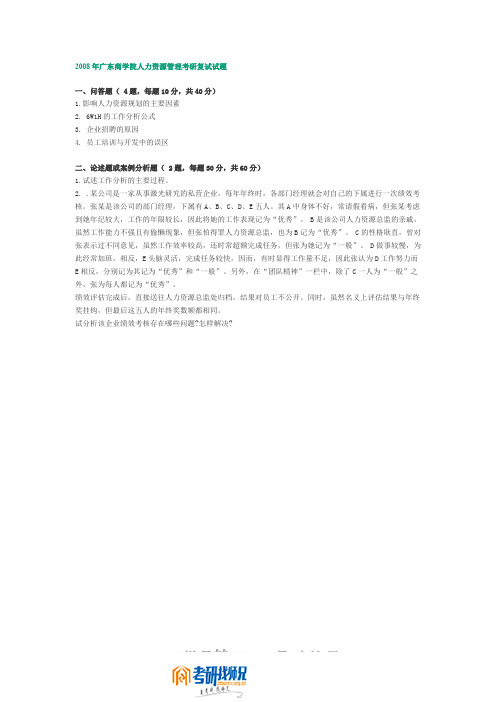
2008年广东商学院人力资源管理考研复试试题
一、问答题( 4题,每题10分,共40分)
1.影响人力资源规划的主要因素
2. 6W1H的工作分析公式
3. 企业招聘的原因
4. 员工培训与开发中的误区
二、论述题或案例分析题( 2题,每题30分,共60分)
1.试述工作分析的主要过程。
2. .某公司是一家从事激光研究的私营企业,每年年终时,各部门经理就会对自己的下属进行一次绩效考核。
张某是该公司的部门经理,下属有A、B、C、D、E五人。
其A中身体不好,常请假看病,但张某考虑到她年纪较大,工作的年限较长,因此将她的工作表现记为“优秀”。
B是该公司人力资源总监的亲戚,虽然工作能力不强且有偷懒现象,但张怕得罪人力资源总监,也为B记为“优秀”。
C的性格耿直,曾对张表示过不同意见,虽然工作效率较高,还时常超额完成任务,但张为她记为“一般”。
D做事较慢,为此经常加班,相反,E头脑灵活,完成任务较快,因而,有时显得工作量不足,因此张认为D工作努力而E相反,分别记为其记为“优秀”和“一般”。
另外,在“团队精神”一栏中,除了C一人为“一般”之外,张为每人都记为“优秀”。
绩效评估完成后,直接送往人力资源总监处归档,结果对员工不公开。
同时,虽然名义上评估结果与年终奖挂钩,但最后这五人的年终奖数额都相同。
试分析该企业绩效考核存在哪些问题?怎样解决?。
广东商学院考研真题804-民法学
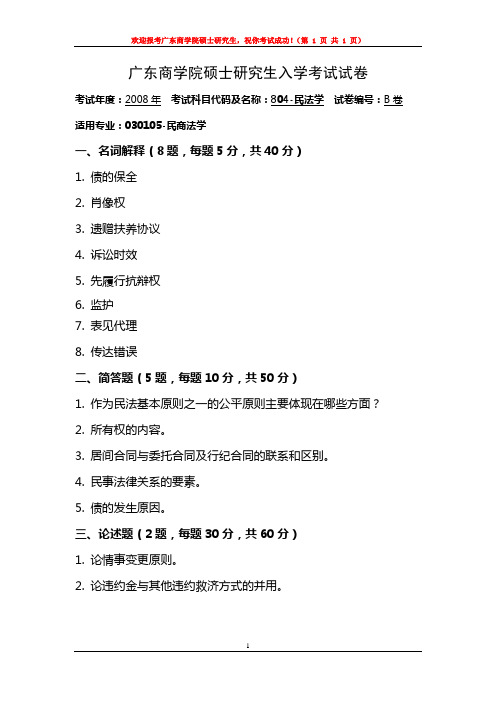
欢迎报考广东商学院硕士研究生,祝你考试成功!(第 1 页共 1 页)
广东商学院硕士研究生入学考试试卷
考试年度:2008年考试科目代码及名称:804-民法学试卷编号:B卷适用专业:030105-民商法学
一、名词解释(8题,每题5分,共40分)
1. 债的保全
2. 肖像权
3. 遗赠扶养协议
4. 诉讼时效
5. 先履行抗辩权
6. 监护
7. 表见代理
8. 传达错误
二、简答题(5题,每题10分,共50分)
1. 作为民法基本原则之一的公平原则主要体现在哪些方面?
2. 所有权的内容。
3. 居间合同与委托合同及行纪合同的联系和区别。
4. 民事法律关系的要素。
5. 债的发生原因。
三、论述题(2题,每题30分,共60分)
1. 论情事变更原则。
2. 论违约金与其他违约救济方式的并用。
1。
广东商学院2008年研究生考试复试试卷-英语听力

广东商学院2008年研究生考试复试试卷-英语听力广东商学院2008年研究生考试复试试卷-英语听力Directions: You will hear 5 passages; each passage will be read twice. After the second reading of each passage, questions will not be read, and you will have only 2 minutes to choose the best answer from the 4 choices marked A, B, C and D.(2 points for each)Passage OneQuestions 1 to 5 are based on the passage you have just heard.1. How did the speaker feel when his father asked him to help cut grass?A) Anxious and worried.B) Proud and excited.C) Nervous and confused.D) Inspired and confident.2. Who together with the speaker cut the grass that day?A) Only the speaker himselfB) His father, his brother and the speakerC) Only his fatherD) Only his brother3. How did the speaker feel by the end of that day?A) Happy enoughB) Exhausted but goodC) Very tiredD) Really exhausted4. What did his father do when the speaker missed cutting some leaves?A) His father scolded him severely.B) His father took back the six dollars.C) His father made him do the cutting again.D) His father cut the leaves himself.5. What did the speaker want to tell us in this passage?A) One can benefit a lot from working with his father.B) Manual labourers shouldn’t be looked down upon.C) One should always do his job earnestly.D) Teenagers tend to be careless.Passage TwokQuestions 6 to 10 are based on the passage you have just heard.6. What does the speaker do for a living?A) He works on a farm with his wife.B) He works in an advertising agency.C) He runs a village shop with his wife.D) He was a gardener.7. What did the speaker do for a living?A) He ran a village shop.B) He worked on a farm.C) He worked in an advertising agency.D) He was a gardener.8. What do we know about the speaker's life in the past?A) It was stressful.B) It was colorful.C) It was peaceful.D) It was boring.9. What made the speaker change his life style?A) His desire to start his own business.B) The crisis in his family life.C) The decline in his health.D) His dream of living in the countryside.10. Does the speaker like to look back at his life in the past?A) Yes. He cherishes it very much.B) No. He is afraid to do so.C) No. He likes to do it.D) Yes. He likes to look back.Passage ThreeQuestions 11 to 15 are based on the passage you have just heard.11. Why is it difficult to locate Cambridge University?A) Because there are no signs to direct them.B) Because no tour guides are available.C) Because all the buildings in the city look alike.D) Because the university is everywhere in the city.12. How many self-governing colleges does the university have?A) It has 61.B) It has 41.C) It consists of 51.D) It consists of 31.13. What does the passage tell us about the colleges of the university?A) They set their own exams.B) They select their own students.C) They award their own degrees.D) They organize their own laboratory work.14. What can be learnt from the passage about the libraries in Cambridge University?A) Most of them have a long history.B) Many of them are specialized libraries.C) They house more books than any other university library.D) They each have a copy of every book published in Britain.15. What does we know from the passage tell us about the women students in Cambridge university?A) Very few of them are engaged in research.B) They were not awarded degrees until 1948.C) They have outnumbered male students.D) They were not treated equally until 1881.Passage FourQuestions 16 to 20 are based on the passage you have just heard.16. What is typical of non-readers according to early research﹖A) They are interested in other kinds of reading.B) They are active in voluntary services.C) They tend to be low in education and in income.D) They live in isolated areas.17. Where is the first group of non-readers more likely to live?A) Crowed apartmentsB) Down townC) Rural areasD) In usual areas18. What are the finds of recent surveys﹖A) The reasons why –people don’t read newspapers are more complicated than assumed.B) There are more uneducated people among the wealthy than originally expected.C) The number of newspaper readers is steadily increasing.D) There are more nonreaders among the age of group of 26 to 65 people nowadays.19. The second group is regarded as of non-readers, becauseA) they have no time.B) they have no money.C) they have no interest.D) they have no time to read and they have no interest in content.20. What are editors and publishers doing to attract the non-readers﹖A) Lowering the prices of their newspapers.B) Shortening their news stories.C) Adding variety to their newspaper content.D) Including more advertisements in their newspapers.Passage FiveQuestions 21 to 25 are based on the passage you have just heard.21. What does the nest built by tailor bird look like﹖A) A basket.B) A cupC) An egg.D) An oven.22. What are the common materials used for nests?A) Mud and grassesB) Branches, grasses and feathersC) Mud and feathersD) Grasses and branches23. Why is there a hole in the weaver bird’s nests﹖A) To let in the sunshine.B) To serve as its door.C) To keep the nest cool.D) For the bird to lay eggs.24. What is the oven bird’s nest made of﹖A) Branches.B) Grasses.C) Mud.D) Straw.25. What might surprise us about birds’ nests according to the speaker﹖A) Some are built underground.B) Some can be eaten.C) Most are sewed with grasses.D) Most are dried by the sun.This is the end of the listening test.Good luck!Directions: You will hear 5 passages; each passage will be read twice. After the second reading of each passage, questions will not be read, and you will have only 2 minutes to choose the best answer from the 4 choices marked A, B, C and D.(2 points for each)Passage OneQuestions 1 to 5 are based on the passage you have just heard.1. How did the speaker feel when his father asked him to help cut grass?A) Anxious and worried.B) Proud and excited.C) Nervous and confused.D) Inspired and confident.2. Who together with the speaker cut the grass that day?A) Only the speaker himselfB) His father, his brother and the speakerC) Only his fatherD) Only his brother3. How did the speaker feel by the end of that day?A) Happy enoughB) Exhausted but goodC) Very tiredD) Really exhausted4. What did his father do when the speaker missed cutting some leaves?A) His father scolded him severely.B) His father took back the six dollars.C) His father made him do the cutting again.D) His father cut the leaves himself.5. What did the speaker want to tell us in this passage?A) One can benefit a lot from working with his father.B) Manual labourers shouldn’t be looked down upon.C) One should always do his job earnestly.D) Teenagers tend to be careless.Passage TwokQuestions 6 to 10 are based on the passage you have just heard.6. What does the speaker do for a living?A) He works on a farm with his wife.B) He works in an advertising agency.C) He runs a village shop with his wife.D) He was a gardener.7. What did the speaker do for a living?A) He ran a village shop.B) He worked on a farm.C) He worked in an advertising agency.D) He was a gardener.8. What do we know about the speaker's life in the past?A) It was stressful.B) It was colorful.C) It was peaceful.D) It was boring.9. What made the speaker change his life style?A) His desire to start his own business.B) The crisis in his family life.C) The decline in his health.D) His dream of living in the countryside.10. Does the speaker like to look back at his life in the past?A) Yes. He cherishes it very much.B) No. He is afraid to do so.C) No. He likes to do it.D) Yes. He likes to look back.Passage ThreeQuestions 11 to 15 are based on the passage you have just heard.11. Why is it difficult to locate Cambridge University?A) Because there are no signs to direct them.B) Because no tour guides are available.C) Because all the buildings in the city look alike.D) Because the university is everywhere in the city.12. How many self-governing colleges does the university have?A) It has 61.B) It has 41.C) It consists of 51.D) It consists of 31.13. What does the passage tell us about the colleges of the university?A) They set their own exams.B) They select their own students.C) They award their own degrees.D) They organize their own laboratory work.14. What can be learnt from the passage about the libraries in Cambridge University?A) Most of them have a long history.B) Many of them are specialized libraries.C) They house more books than any other university library.D) They each have a copy of every book published in Britain.15. What does we know from the passage tell us about the women students in Cambridge university?A) Very few of them are engaged in research.B) They were not awarded degrees until 1948.C) They have outnumbered male students.D) They were not treated equally until 1881.Passage FourQuestions 16 to 20 are based on the passage you have just heard.16. What is typical of non-readers according to early research﹖A) They are interested in other kinds of reading.B) They are active in voluntary services.C) They tend to be low in education and in income.D) They live in isolated areas.17. Where is the first group of non-readers more likely to live?A) Crowed apartmentsB) Down townC) Rural areasD) In usual areas18. What are the finds of recent surveys﹖A) The reasons why –people don’t read newspapers are more complicated than assumed.B) There are more uneducated people among the wealthy than originally expected.C) The number of newspaper readers is steadily increasing.D) There are more nonreaders among the age of group of 26 to 65 people nowadays.19. The second group is regarded as of non-readers, becauseA) they have no time.B) they have no money.C) they have no interest.D) they have no time to read and they have no interest in content.20. What are editors and publishers doing to attract the non-readers﹖A) Lowering the prices of their newspapers.B) Shortening their news stories.C) Adding variety to their newspaper content.D) Including more advertisements in their newspapers.Passage FiveQuestions 21 to 25 are based on the passage you have just heard.21. What does the nest built by tailor bird look like﹖A) A basket.B) A cupC) An egg.D) An oven.22. What are the common materials used for nests?A) Mud and grassesB) Branches, grasses and feathersC) Mud and feathersD) Grasses and branches23. Why is there a hole in the weaver bird’s nests﹖A) To let in the sunshine.B) To serve as its door.C) To keep the nest cool.D) For the bird to lay eggs.24. What is the oven bird’s nest made of﹖A) Branches.B) Grasses.C) Mud.D) Straw.25. What might surprise us about birds’ nests according to the speaker﹖A) Some are built underground.B) Some can be eaten.C) Most are sewed with grasses.D) Most are dried by the sun.This is the end of the listening test.Good luck!。
2008年全国法律硕士非法学基础答案

2008年法律硕士(非法学)专业基础真题答案解析一、单项选择题1.C【解析】根据《刑法》第17条第2款,已满14周岁不满16周岁的人,犯故意杀人、故意伤害致人重伤或者死亡、强奸、抢劫、贩卖毒品、放火为、爆炸、投放危险物质罪的,应当负刑事责任。
已满14周岁不满16周岁的人对选项A的“拐卖儿童”、选项B的“抢夺”和选项D的“绑架”,不负刑事责任。
本题应选C。
2.B【解析】基本的犯罪构成,是指刑法条文就某一犯罪的基本形态所规定的犯罪构成。
《刑法》第232条“故意杀人的,处死刑、无期徒刑或者十年以上有期徒刑;情节较轻的,处三年以上十年以下有期徒刑”就是关于故意杀人罪基本构成的规定。
修正的犯罪构成,是指以基本的犯罪构成为基础并对之进行补充、扩展而形成的犯罪构成。
修正的犯罪构成通常包括帮助、教唆、预备、未遂、中止等形态。
故本题应选B。
标准的犯罪构成,又称普通的犯罪构成,指刑法条文对具有通常法益侵害程度的行为所规定的犯罪构成,比如《刑法》第232条“故意杀人的、处死刑、无期徒刑或者十年以上有期徒刑”属于故意杀人罪的标准的犯罪构成。
0派生的犯罪构成,是指以标准的犯罪构成为基础,因为具有较轻或者较重的法益侵害程度而从标准的犯罪构成中派生出来的犯罪构成,比如《刑法》第232条“情节较轻的,处三年以上十年以下有期徒刑”属于派生的犯罪构成,且属于减轻的犯罪构成。
3.D【解析】不作为的危害行为,是指消极的行为即行为人消极地不属行法律义务而危害社会的行为。
从表现形式看,不作为是消极的行动;从违反法律规范的性质来看,不作为直接违反了某种命令性规范。
这项A属于作为的过失致人死亡行为,选项B属于作为的故意杀人行为,选项C的出卖行为也是作为行为。
选项D中丁的行为属于拒绝履行抚养义务,构成遗弃罪,属于不作为。
4.B【解析】根据《宪法》第18条第1款,精神病人在不能辨认或者不能控制自己行为的时候造成危害结果,经法定程序鉴定确认的,不负刑事责任。
2008年考研法律硕士(非法学)考研专业课真题及答案

2008年考研法律硕士(非法学)考研专业课真题及答案一、单项选择题(每题的备选项中,只有1个最符合题意)1、我国国家赔偿以国家机关及其工作人员行使职权时的()为前提条件。
A.个人过错B.公务过错C.行为违法D.无过错责任2、根据《国务院关于全面推进依法行政实施纲要》,依法界定执法职责,科学设定执法岗位,规范执法程序。
要建立公开.公平.公正的评议考核制和执法过错或者错案责任追究制,评议考核应当听取()的意见。
要积极探索行政执法绩效评估和奖惩办法。
A.公众B.领导C.监察机关D.人事机关.3、下面选项中不属于全面推进依法行政,实现建设法治政府目标的是()A.中央政府和地方政府之间.政府各部门之间的职能和权限比较明确B.行为规范.运转协调.公正透明.廉洁高效的行政管理体制基本形成。
C.权责明确.行为规范.监督有效.保障有力的行政执法体制基本建立。
D.政府各职能明确分工,互不干涉,各自执法。
4、根据《国务院关于全面推进依法行政实施纲要》,要实现行政机关工作人员特别是各级领导干部依法行政的观念明显提高,尊重法律.崇尚法律.遵守法律的氛围基本形成;依法行政的能力明显增强,善于运用()手段管理经济.文化和社会事务,能够依法妥善处理各种社会矛盾。
A.法律B.经济C.政治D.文化5、根据《国务院关于全面推进依法行政实施纲要》,提出法律议案和地方性法规草案,制定行政法规.规章以及规范性文件等制度建设,重在提高( )。
A.质量B.数量C.总量D.积累量6、根据《国务院关于全面推进依法行政实施纲要》,依法界定执法职责,科学设定执法岗位,规范执法程序。
要建立公开.公平.公正的评议考核制和执法过错或者错案责任追究制,评议考核应当听取()的意见。
要积极探索行政执法绩效评估和奖惩办法。
A.公众B.领导C.监察机关D.人事机关.7、下列行为中国家应负赔偿责任的是()A.某市公安局的违法拘留行为B.某省人民代表大会的立法行为C.某市银行的违法划拨存款行为D.某市卫生局在法律范围内的裁量行为8、关于赔偿请求人向共同赔偿义务机关要求赔偿的说法中,正确的是:()A.赔偿请求人应当向共同赔偿义务机关中最先侵权的赔偿义务机关要求赔偿B.赔偿请求人应当向共同赔偿义务机关中最先被确认违法的赔偿义务机关要求赔偿C.赔偿请求人可以向共同赔偿义务机关中的任何一个要求赔偿D.应当向共同赔偿义务机关协商酌定9、根据《国务院关于全面推进依法行政实施纲要》,深化行政执法体制改革,要减少行政执法层次,适当下移执法重心;对与人民群众日常生活.生产直接相关的行政执法活动,主要由( )两级行政执法机关实施。
